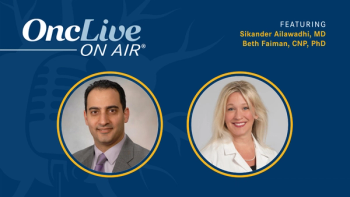
Amgen Files sNDAs for Carfilzomib to Treat Multiple Myeloma in Europe, US
Amgen has announced that it has submitted supplemental New Drug Applications (sNDA) in the United States and Europe based on data from 2 phase III studies showing carfilzomib (Kyprolis) improves overall survival (OS) for patients with relapsed/refractory multiple myeloma.
Sean E. Harper, MD
Amgen has announced that it has submitted supplemental New Drug Applications (sNDA) in the United States and Europe based on data from 2 phase III studies showing carfilzomib (Kyprolis) improves overall survival (OS) for patients with relapsed/refractory multiple myeloma.
Results from the ASPIRE study released earlier this week showed the combination of carfilzomib, lenalidomide (Revlimid), and dexamethasone reduced the risk for death by 21% compared with lenalidomide and dexamethasone alone following prior treatment with 1 to 3 regimens.1
In results from the ENDEAVOR trial released earlier this year, carfilzomib plus dexamethasone improved OS by 21% versus dexamethasone plus bortezomib (Velcade).2
“Kyprolis is the first-and-only multiple myeloma therapy to demonstrate superior overall survival in a head-to-head comparison with a current standard of care, extending survival by 7.6 months over Velcade,” Sean E. Harper, MD, executive vice president of Research and Development at Amgen, said in a press release. “We submitted these important data to regulatory authorities in the US and Europe because we know that KYPROLIS may offer appropriate multiple myeloma patients a better chance for a longer life at first relapse compared to Velcade when added to dexamethasone.”
ASPIRE enrolled 792 patients who had undergone a median of two prior treatment regimens. Patients were randomized 1:1 to receive the 3-drug carfilzomib regimen or lenalidomide plus low-dose dexamethasone alone. In both groups of the trial, 66% of patients had received prior bortezomib and 20% had prior lenalidomide.
Researchers administered a starting dose of 20 mg/m2 carfilzomib followed by 27 mg/m2 thereafter, along with 25 mg lenalidomide and 40 mg dexamethasone during the 28-day treatment cycle. Though carfilzomib was not administered beyond 18 cycles, the median treatment exposure was 22 cycles.
At the 24-month interim analysis, 73.3% of patients in the carfilzomib arm were alive versus 65% with the 2-drug regimen. The objective response rate was 87.4% versus 66.9%, with a median duration of response of 28.6 months with carfilzomib versus 21.2 months without. Among responders, the complete response rate was 17.7% with carfilzomib versus 5.1% without and the very good partial response rate was 70.4% with carfilzomib versus 40.7% in the control arm.
Median OS was 48.3 months with the carfilzomib combination versus 40.4 months with lenalidomide/dexamethasone alone (HR, 0.79; 95% CI, 0.67-0.95). The OS benefit analysis was consistent, even in those who received prior treatment with bortezomib. Researchers observed a 25% reduction in the risk for death with carfilzomib in patients naïve to bortezomib versus a 16% reduction for those treated with the proteasome inhibitor.
In updated data from ENDEAVOR presented in March at the 16th International Myeloma Workshop (IMW), the median OS with carfilzomib plus dexamethasone was 47.6 months compared with 40.0 months for bortezomib and dexamethasone (HR, 0.79; 95% CI, 0.65-0.96).
As initially reported, patients were assigned to a starting dose of 20 mg/m2 carfilzomib on days 1 and 2 of cycle 1 along with dexamethasone (n = 464) or bortezomib and dexamethasone (n = 465). If tolerated, the dose was escalated to 56 mg/m2 on day 8 of cycle 1 and maintained throughout subsequent cycles.
Risk for progression was reduced by 47% for patients assigned to carfilzomib compared with bortezomib. The median PFS with carfilzomib was 18.7 months versus 9.4 months with bortezomib (HR, 0.53; 95% CI, 0.44-0.65; P <.0001). The advantage in PFS seen with carfilzomib was consistent across subgroups.
The ORR was 77% with carfilzomib versus 63% with bortezomib, and the complete response rate was 13% versus 6%, respectively. The rate of very good partial response or better with carfilzomib was 54% compared with 29% with bortezomib.
The FDA expanded the approval for carfilzomib in July 2015 to include patients with relapsed multiple myeloma who received at least 1 to 3 prior lines of therapy, based on results from the phase III ASPIRE trial. Carfilzomib had previously received an accelerated approval in July 2012 as a treatment for patients with multiple myeloma following at least 2 therapies, including bortezomib and an immunomodulatory agent.
References
- Stewart KA, Rajkumar VS, Dimopoulos MA, et al. Carfilzomib, lenalidomide, and dexamethasone for relapsed multiple myeloma. N Engl J Med. 2015; 372:142-152.
- Dimopoulos MA, Moreau P, Palumbo A, et al. Carfilzomib and dexamethasone (Kd) vs bortezomib and dexamethasone (Vd) in patients (pts) with relapsed multiple myeloma (RMM): results from the phase III study ENDEAVOR. J Clin Oncol. 2015;(suppl; abstr 8509). http://ascopubs.org/doi/abs/10.1200/jco.2015.33.15_suppl.8509.


































